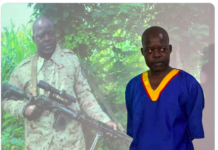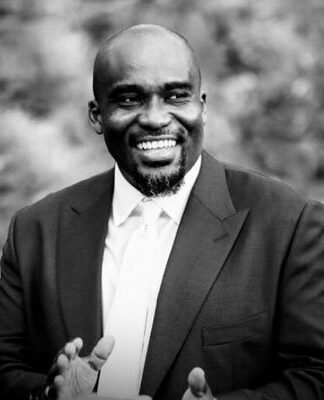Federal prosecutors have asked to delay Beatrice Munyenyezi’s sentencing because the Boston-based attorneys have been heavily involved in the response to last month’s Boston Marathon bombings. But Munyenyezi’s lawyers say the Manchester woman, convicted in February of lying on immigration forms about her role in Rwanda’s 1994 genocide, shouldn’t have to wait.
They believe Munyenyezi has already been incarcerated four times longer than the maximum period allowed under 2003 sentencing guidelines, the ones in place when she is accused of lying about her past in Rwanda.
“We’re very sympathetic to the resources the marathon bombings is taking,” attorney Mark Howard said. “But we have a client’s interests to protect. And I don’t think anyone would want to sit in jail and wait just because the government is busy.”
Munyenyezi was convicted of immigration fraud during a two-week trial in February, a proceeding held only after a first one in her case ended in a mistrial in March 2012. During the second trial, prosecutors called nearly a dozen Rwandan witnesses to the stand, with each connecting Munyenyezi to the violence in some way.
Several placed her at a roadblock outside the hotel owned by her husband’s family where prosecutors say Munyenyezi checked identification cards and separated ethnic Tutsis, who would be killed or raped. Other witnesses described seeing Munyenyezi wear the colorful clothing of the MRND party, which organized the violence. Prosecutors called it evidence that Munyenyezi had lied when she told immigration officials she wasn’t politically affiliated.
The jury convicted Munyenyezi after about four hours of deliberation. The mother of three – who applied in 1995 to come to the United States as a refugee and was naturalized in 2003 – was immediately stripped of her citizenship by Judge Stephen McAuliffe.
Her lawyers say they will appeal the decision. They’ve also filed a motion asking McAuliffe to acquit Munyenyezi, arguing the evidence provided by prosecutors was insufficient and unreliable.
Assistant U.S. Attorneys John Capin and Aloke Chakravarty haven’t responded to that motion, and they’ve asked a judge for more time to do so. In the same request, they asked to push back the sentencing hearing, scheduled for June 3.
Both men are members of the Antiterrorism and National Security Unit of the Boston U.S. Attorney’s Office.
“Since the marathon bombings . . . Chakravarty has spent most of his waking hours stationed at the FBI’s investigative command center, overseeing legal aspects of the response to the bombings,” the prosecutors wrote in their request, filed Friday.
Under current sentencing guidelines, Munyenyezi could be ordered to serve up to 10 years in federal prison, after which she would face extradition. But the prosecutors argue in their motion that the evidence at trial could warrant a “significant upward departure from the applicable guideline sentencing range,” certainly one that would mean her incarceration well past the June sentencing.
The motion does not detail what sentence the prosecutors plan to ask for, and both Capin and Chakravarty declined to comment yesterday.
Defense attorney David Ruoff said he and Howard will likely ask that Munyenyezi, who is incarcerated at the Strafford County jail, be released immediately due to the time she’s already served.
Munyenyezi has been behind bars since her June 2010 arrest, except for the period between her two trials when a judge allowed her to be detained on home confinement. By Ruoff’s count, that totals about 23 months of pretrial confinement credit.
Under 2003 sentencing guidelines, in place when Munyenyezi is accused of lying on immigration forms, the punishment for her crimes ranged from probation to six months of incarceration, Ruoff said.
“We are opposed to (a continuation) because we believe that a proper calculation of the sentencing guidelines would suggest that she has already served four times more in jail than she would be sentenced to under the sentencing guidelines,” Howard said.
The defense attorneys have not filed an objection to the prosecutors request but Howard said they plan to do so soon.
In their motion for acquittal, the defense raises many of the same points they did at trial. Munyenyezi has claimed to be falsely accused, saying the witnesses who testified against her were led to lie either directly by the Rwandan government or indirectly by societal pressures that make Rwandans likely to conform to authority.
The jury rejected that theory.
But Munyenyezi’s lawyers are asking McAuliffe to weigh the possibility himself.
“Such a component is never present in a typical bank-robbery case. If the jury failed to understand the uncontested dynamic at play in current Rwanda, this court is nonetheless free to consider it,” they wrote in the motion.
The lawyers asked the judge to consider the unconventional nature of the trial – in which witnesses flown in from a foreign country spoke, through translators, about events nearly two decades prior – when deciding whether the evidence was believable.
Ruoff acknowledged yesterday that motions for acquittal are mostly, though not always, denied. He said if the request is not granted, he will appeal the case to 2nd U.S. Circuit Court of Appeals.
“We plan on fighting this until the very end,” he said.
Ruoff also said he’s received dozens of emails from around the world since the jury gave its verdict, most supporting his client. Several, he said, are from employees of governments who refuse to extradite individuals to Rwanda because they don’t believe they would receive fair treatment there.
“It’s very revealing,” Ruoff said. “It helps us have more faith in our theory of defense, which obviously the jury did not accept.”
TRICIA L. NADOLNY
Source:CONCORD MONITOR































































